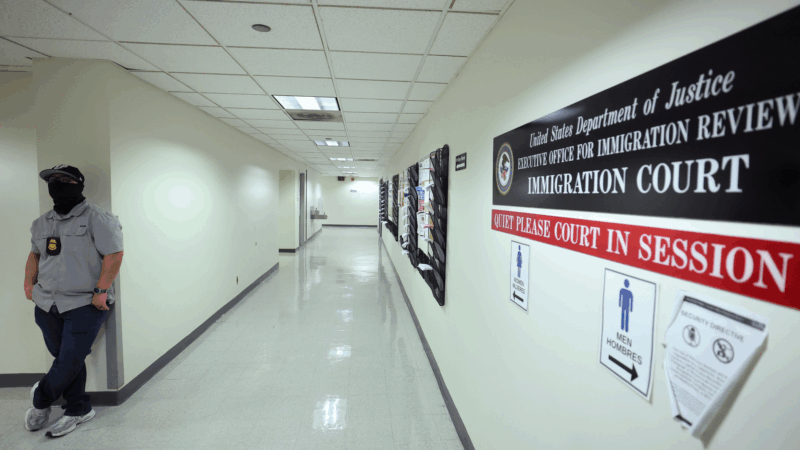Trump administration fires more immigration judges
Nearly 20 immigration judges received emails this month informing them that they are being let go, NPR has learned, adding to the over 80 judges that have already been cut by President Trump so far this year.
At least 14 immigration judges learned last Friday that they would be put on leave and that their employment would terminate as soon as Wednesday in some cases, according to two people familiar with the firings and a confirmation from the International Federation of Professional and Technical Engineers (IFPTE), a union that represents immigration judges. The two people spoke on condition of anonymity for fear of reprisals. Courts in Florida, New York, Maryland, California and Washington state are among those affected.
The move follows the firing of five other immigration judges earlier this month. The firings in September constitute the largest terminations in any month since two dozen immigration judges were fired in February right before their first day on the job.
The firings are seemingly at odds with the Trump administration’s goals of immigration enforcement, advocates say. The administration counters that immigration judges have not managed their mounting caseloads effectively, and that it has taken steps to streamline the process involved in adjudicating cases. The dispute provides a window into just how complicated the Trump administration’s efforts to lower illegal immigration and deport millions of undocumented people are.
Union leaders had been bracing for large cuts this month since it marked the end of the two-year probationary period for many immigration judges. The increased firings come as the Trump administration is trying to increase the number of deportations. Immigration judges, who are more like civil servants, can approve or deny a final order of deportation. Still, immigration advocates argue the high priority on immigration law enforcement is reducing the limited due process that immigrants receive because the dismissed judges are either replaced with adjudicators with no experience or are not replaced at all.
“The dismissal of more immigration judges is an illogical and costly setback for the nation’s immigration courts,” said IFPTE President Matt Biggs in a statement to NPR. “At a time when the backlog has reached historic levels and the administration has made immigration enforcement a central issue, the removal of experienced judges is hypocritical, undermines the law, wastes taxpayer dollars, and further delays justice for citizens and immigrants alike.”
Not all judges to be dismissed this year have been at the end of their probationary period with the Executive Office for Immigration Review (EOIR), which is a part of the U.S. Justice Department. Still, the firings have resulted in a culture of fear among EOIR employees. Dozens took the “Fork in the Road,” a voluntary resignation program introduced after President Trump took office aimed at reducing the size of the federal workforce. EOIR declined to comment.
In the past nine months, EOIR has lost more than 125 judges to firings and voluntary resignations, down from about 700 judges at the start of the year. The loss of judges has resulted in immigration cases being delayed as far out as 2029, NPR previously reported, as vacancies increase despite open job postings to fill roles in those courts.
Terminations continue amid growing backlogs
The latest sets of terminations landed after Congress approved a mega-spending bill that allocated over $3 billion to the Justice Department for immigration-related activities, including hiring more immigration judges. The funding and additional personnel are aimed at alleviating the growing case backlog, which stands at nearly 4 million. Hiring and training new judges can take more than a year.
In recent months, EOIR leadership has criticized judges for not efficiently managing their caseloads, and has encouraged adjudicators to streamline asylum reviews and give oral, as opposed to written, decisions on case dismissals.
Earlier this month, about 600 military lawyers were authorized to work for the Justice Department as temporary immigration judges. And the DOJ made changes to who could qualify as a temporary immigration judge — effectively lowering the requirements and removing the need to have prior immigration experience.
Paul McCartney’s decade of transformation: From Beatles breakup to John Lennon’s murder
Man on the Run shows McCartney's effort to define himself outside The Beatles' shadow: "Paul making this documentary was a way of coming to terms with that whole period," says director Morgan Neville.
A Biden-era rule sought to stabilize child care. Why Trump wants it gone
The Trump administration has proposed repealing a Biden-era rule that required states to change how they pay out child care subsidies, citing the potential for fraud.
Greetings from Southwest Papua, which has some of the world’s richest marine biodiversity
The Raja Ampat islands in Indonesia's Southwest Papua province are a marine biodiversity hotspot and a divers' paradise.
Families remember U.S. reservists killed in Kuwait, members of an Iowa logistics unit
Four U.S. soldiers were killed in the Iran war on Sunday and IDed Tuesday by the Pentagon; two soldiers haven't yet been publicly identified. Their unit kept troops supplied with food and equipment.
Why supporting a shelter for women is now ‘kind of radioactive’
That's how researcher Beatriz Garcia Nice describes the new U.S. stance under the Trump administration to programs addressing gender-based violence.
Telehealth abortion is in the courts. Share your experience.
Mifepristone is facing another major legal challenge.








